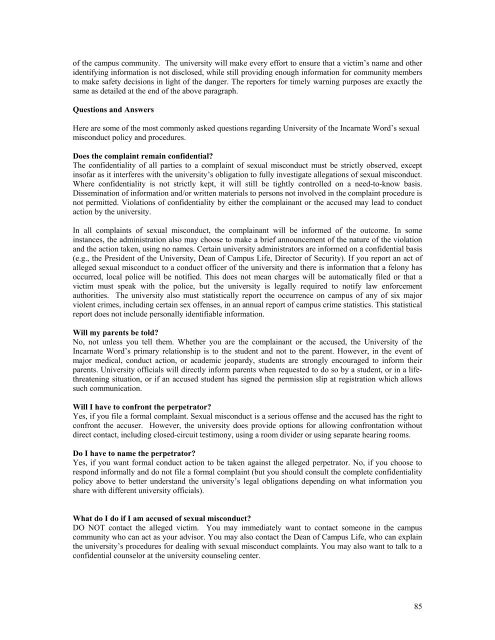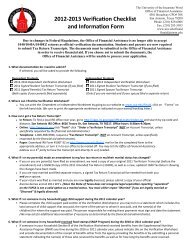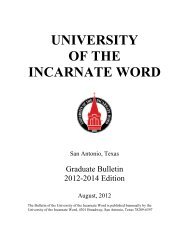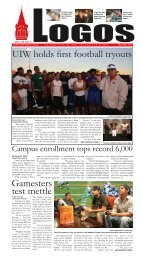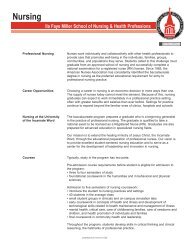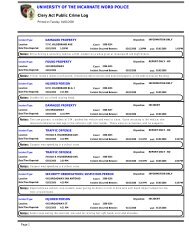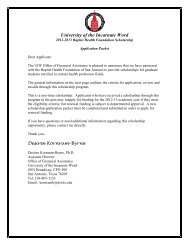2006-2007 Student Handbook - University of the Incarnate Word
2006-2007 Student Handbook - University of the Incarnate Word
2006-2007 Student Handbook - University of the Incarnate Word
Create successful ePaper yourself
Turn your PDF publications into a flip-book with our unique Google optimized e-Paper software.
<strong>of</strong> <strong>the</strong> campus community. The university will make every effort to ensure that a victim’s name and o<strong>the</strong>ridentifying information is not disclosed, while still providing enough information for community membersto make safety decisions in light <strong>of</strong> <strong>the</strong> danger. The reporters for timely warning purposes are exactly <strong>the</strong>same as detailed at <strong>the</strong> end <strong>of</strong> <strong>the</strong> above paragraph.Questions and AnswersHere are some <strong>of</strong> <strong>the</strong> most commonly asked questions regarding <strong>University</strong> <strong>of</strong> <strong>the</strong> <strong>Incarnate</strong> <strong>Word</strong>’s sexualmisconduct policy and procedures.Does <strong>the</strong> complaint remain confidential?The confidentiality <strong>of</strong> all parties to a complaint <strong>of</strong> sexual misconduct must be strictly observed, exceptins<strong>of</strong>ar as it interferes with <strong>the</strong> university’s obligation to fully investigate allegations <strong>of</strong> sexual misconduct.Where confidentiality is not strictly kept, it will still be tightly controlled on a need-to-know basis.Dissemination <strong>of</strong> information and/or written materials to persons not involved in <strong>the</strong> complaint procedure isnot permitted. Violations <strong>of</strong> confidentiality by ei<strong>the</strong>r <strong>the</strong> complainant or <strong>the</strong> accused may lead to conductaction by <strong>the</strong> university.In all complaints <strong>of</strong> sexual misconduct, <strong>the</strong> complainant will be informed <strong>of</strong> <strong>the</strong> outcome. In someinstances, <strong>the</strong> administration also may choose to make a brief announcement <strong>of</strong> <strong>the</strong> nature <strong>of</strong> <strong>the</strong> violationand <strong>the</strong> action taken, using no names. Certain university administrators are informed on a confidential basis(e.g., <strong>the</strong> President <strong>of</strong> <strong>the</strong> <strong>University</strong>, Dean <strong>of</strong> Campus Life, Director <strong>of</strong> Security). If you report an act <strong>of</strong>alleged sexual misconduct to a conduct <strong>of</strong>ficer <strong>of</strong> <strong>the</strong> university and <strong>the</strong>re is information that a felony hasoccurred, local police will be notified. This does not mean charges will be automatically filed or that avictim must speak with <strong>the</strong> police, but <strong>the</strong> university is legally required to notify law enforcementauthorities. The university also must statistically report <strong>the</strong> occurrence on campus <strong>of</strong> any <strong>of</strong> six majorviolent crimes, including certain sex <strong>of</strong>fenses, in an annual report <strong>of</strong> campus crime statistics. This statisticalreport does not include personally identifiable information.Will my parents be told?No, not unless you tell <strong>the</strong>m. Whe<strong>the</strong>r you are <strong>the</strong> complainant or <strong>the</strong> accused, <strong>the</strong> <strong>University</strong> <strong>of</strong> <strong>the</strong><strong>Incarnate</strong> <strong>Word</strong>’s primary relationship is to <strong>the</strong> student and not to <strong>the</strong> parent. However, in <strong>the</strong> event <strong>of</strong>major medical, conduct action, or academic jeopardy, students are strongly encouraged to inform <strong>the</strong>irparents. <strong>University</strong> <strong>of</strong>ficials will directly inform parents when requested to do so by a student, or in a lifethreateningsituation, or if an accused student has signed <strong>the</strong> permission slip at registration which allowssuch communication.Will I have to confront <strong>the</strong> perpetrator?Yes, if you file a formal complaint. Sexual misconduct is a serious <strong>of</strong>fense and <strong>the</strong> accused has <strong>the</strong> right toconfront <strong>the</strong> accuser. However, <strong>the</strong> university does provide options for allowing confrontation withoutdirect contact, including closed-circuit testimony, using a room divider or using separate hearing rooms.Do I have to name <strong>the</strong> perpetrator?Yes, if you want formal conduct action to be taken against <strong>the</strong> alleged perpetrator. No, if you choose torespond informally and do not file a formal complaint (but you should consult <strong>the</strong> complete confidentialitypolicy above to better understand <strong>the</strong> university’s legal obligations depending on what information youshare with different university <strong>of</strong>ficials).What do I do if I am accused <strong>of</strong> sexual misconduct?DO NOT contact <strong>the</strong> alleged victim. You may immediately want to contact someone in <strong>the</strong> campuscommunity who can act as your advisor. You may also contact <strong>the</strong> Dean <strong>of</strong> Campus Life, who can explain<strong>the</strong> university’s procedures for dealing with sexual misconduct complaints. You may also want to talk to aconfidential counselor at <strong>the</strong> university counseling center.85


